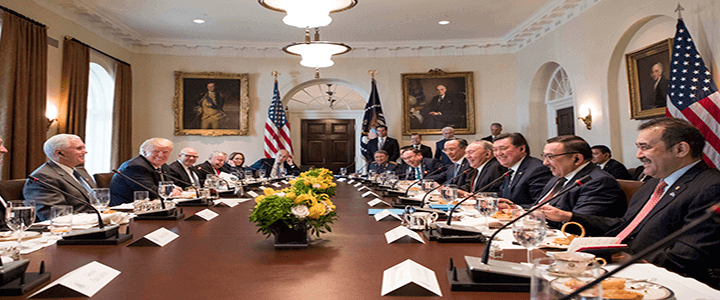In the mid-1980s, I learned a joke in D.C. (yes, that could be considered redundant), that still holds up well today.
A group of scientists discovered an asteroid was hurtling toward Earth, and the planet was just a day away from total destruction. The following morning (this was pre-internet, after all), the papers all obviously covered the story. The Wall Street Journal‘s headline read, “World to End Tomorrow; Markets to Close Early.” USA Today ran the headline, “World to End Tomorrow; How We Really Feel About It.” And the New York Times said, “World to end Tomorrow; Reagan Economic Policies Blamed.”
Little has changed since then. As the on-again, off-again summit with North Korea turned back “on” Friday afternoon, critics went into overdrive.
A few months ago, amidst his “fire and fury” comments, his reckless rhetoric was propelling the world inexorably towards a nuclear apocalypse at the hands of the North Koreans. Sunday, according to the Washington Post, his decision to smile when receiving an emissary from the Democratic People’s Republic of Korea is the latest sign that he’s willing to give away the farm without getting any real concessions from the North.
The Post‘s front page Sunday morning warned of “Stark historical contrast in N. Korea interactions,” telling us the “President’s grip-and-grin intensifies concerns over U.S. message to world.” Online, the headline changes to the equally silly, “‘Speed dating’: Critics worry Trump is already handing propaganda victories to North Korea.”
Which is it? Is Trump being reckless because he’s hell-bent on war with the DPRK, or is it because he’s hell-bent on peace at any cost?
Past is not always prologue
The article begins by recounting the story of former President Bill Clinton’s 2009 mission to Pyongyang to secure the release of two American journalists held captive by the regime of Kim Jong-il. The delegation was under strict instructions from Clinton not to smile. It also mentions similar advice given to President Dwight Eisenhower before a meeting with Soviet leaders following the death of Josef Stalin.
But here, the rush to paint everything Trump does as wrong-headed has hit peak absurdity. The one cogent piece of analysis in the entire Post article comes from Daniel Russel, the vice president for international security and diplomacy at the Asia Society Policy Institute, a foreign policy think tank. Russel, a retired career diplomat who served as assistant secretary of state for East Asia and Pacific affairs in President Barack Obama’s second term, pointed out that Trump’s negotiating style stems from his time in the Manhattan real estate world.
“The Trump thesis of international diplomacy is the Trump thesis of New York real estate dealmaking, which is that step one is to establish a personal — individual or family to family — close relationship with your mark,” Russel told Washington Post White House correspondent David Nakamura. “You build trust, don’t talk business, establish camaraderie and allow the Trump charisma to steep and marinate to soften them up.”
This is different from the traditional view of buttoned-down diplomacy. That does not make it wrong.
The president’s critics are quick to point the finger. Often, the president invites these criticisms. He speaks extemporaneously, seemingly without thought for how his words might be perceived. He makes remarks like the one about how interesting was the letter that North Korea delivered to the White House on Friday, before admitting he hadn’t actually read it. (Mr. President: it’s okay to point out that you’ve been briefed on the letter’s contents, and that you look forward to reading it in detail later in the afternoon. This saves lots of confusion and ridicule.)
There is room for criticism. There’s also room to give at least a little credit where it is due. The president has brought North Korea this far, against the odds. Simply meeting with them doesn’t magically confer legitimacy on their regime any more than any other diplomatic negotiation.
And after all, aren’t we supposed to be happy about talking to our adversaries instead of lobbing nukes at one another?




